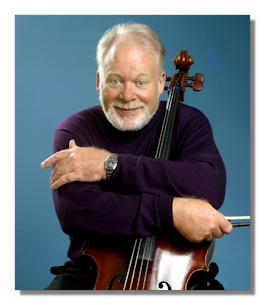
The Internet's Premier Classical Music Source
Related Links
- Latest Reviews
- More Reviews
-
By Composer
-
Collections
DVD & Blu-ray
Books
Concert Reviews
Articles/Interviews
Software
Audio
Search Amazon
Recommended Links
Site News
 Concert Review
Concert Review
Lynn Harrell Plays Dvořák at Orchestra Hall

- Maurice Ravel: La Valse
- Antonín Dvořák: Cello Concerto in B minor, Op. 104 1
- Charles Ives: Symphony #4 2
1 Lynn Harrell, cello
2 University Music Society Choral Union
Detroit Symphony Orchestra/Leonard Slatkin
Detroit, Michigan, Orchestra Hall, 28 April 2013
On a day when great cellist and teacher János Starker left us, fellow great Lynn Harrell visited Detroit and paid tribute with the greatest of concertos for the instrument. Many of the finest cello players – including Yo-Yo Ma – have played the work on this stage, but Harrell remains an exceptional and deeply moving artist. Harrell is perhaps not as flashy as his contemporaries, yet he serves music with a uniquely personal vision. Leonard Slatkin seems to be a good fit for Harrell, for here too is a conductor who offsets a certain lack of flair and star power with a great abundance of musical gifts. Returning to the DSO stage for the first time in several weeks, he led the orchestra in this beautiful, heartfelt, but often challenging program.
Ravel's La Valse started the afternoon with a bang. You could call this piece a Detroit specialty; both Paray and Järvi recorded it with this orchestra, and Slatkin himself just led a fine Ravel disc on Naxos as recently as last year. Paray still remains first choice in this work, either on or off record, but Slatkin's abilities were never in doubt either. What a gorgeous strong tone he and his associates have been drawing from his orchestra! Credit Yoonshin Song, the new DSO concertmistress. Credit the guest conductors, who have let some staggering performances. But don't forget Slatkin, proud member of an innately musical family, who is leading his charges back to first-class status. Everything clicked: all sections at their best. It might not have been the most colorful or virtuosic version of the piece around, but it was certainly satisfying.
The concerto with Harrell seemed much more than that. Harrell is fun to watch; full of energy even as he becomes one of classical music's elder statesmen. Perhaps he would disagree, and why not? Even while not playing, his connection to music is unquestionable. He shot fond looks at the strings, sang along, and immersed himself in everything around him. His tone is personal, too. While his sound takes getting used to, and his fingers have slowed with time, there was no doubt that he was getting exactly what he wanted. It did not seem like an interpretation that would translate especially well to disc. There were mistakes, and it was perhaps lacking in the polish that many artists seem to covet. And yet, that didn't matter. So beautiful was Harrell's vision of the piece, so captivating was his artistry, that we were lost in the music with him. Slatkin and his orchestra clearly believed in what their soloist was doing, as they provided as fine an accompaniment as I have ever heard in this work. Harrell's nearly ethereal exchanges with concertmistress Song in the slow movement were a highlight for me, as his experiences as a chamber musician – not to mention hers – were on display in the most loving way. Overall, it did what this giant among cello concertos must do; pull us in to the music entirely. After the thunderous ovations, Slatkin and Harrell paid tribute to the late Starker with words, then Harrell played a very brief solo piece with Slatkin and the orchestra seemingly as touched as we were. It was one of the more humble and emotional things I have ever witnessed in a concert hall.
After intermission, the Ives proved to be a misfire with the audience. Although Slatkin walked the audience through the piece, in a truncated "Young People's Concert" style, and the orchestra played superbly, it simply didn't work. Slatkin was charming, funny, and candid about his initial impressions about the work while attending the première in 1968 (he didn't enjoy it). Sadly, the work still baffles many years later, and to follow the Dvořák with Ives (Friday's program would have featured Symphony #2) seemed to me a large mistake. The DSO will be playing the Ives symphonies at Carnegie Hall in less than ten days, so I understand the method. But part of orchestral programming is to know and serve your audience. No matter how good the symphony was – and it was excellent – the fact that people left the hall unhappy was not only a shame, but does not bode well for an orchestra trying to bring people back downtown. Still, editorial whining aside, musically the concert was about all one could ask for. Again, Slatkin deserves massive credit for rejuvenating, rebuilding, and redefining. Bravo!
Copyright © 2013, Brian Wigman












